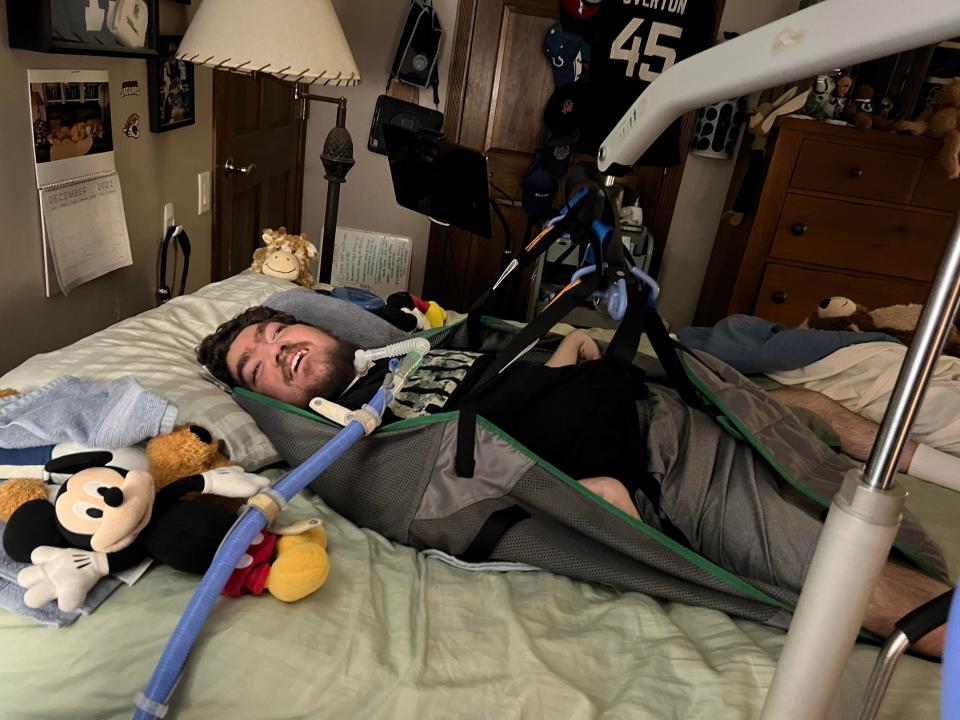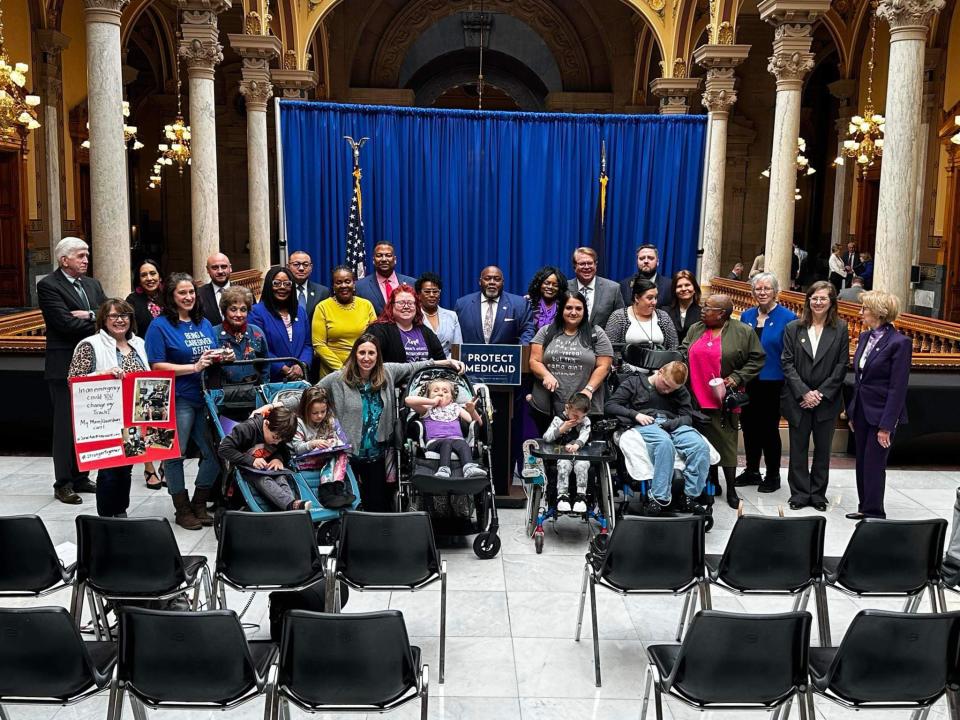Some disabled Hoosiers left at risk after FSSA announces Medicaid waiver changes
FRANKFORT, Ind. — It's just after 2 p.m. on a weekday, and Debby Holcombe knows her son Michael is waiting on her to get him out of his bed.
Using a specialized lift that cradles Michael's body like a hammock, Debby slowly maneuvers him to a customized wheelchair, lowering him into it comfortably so she can bring him into the living room. The entire process takes some 20 minutes and Debby has it down to a science after providing around-the-clock care for Michael throughout his 24 years.
Michael was diagnosed at birth with spastic quadriplegic cerebral palsy, Debby explained, while Michael also suffers from intractable seizures that cannot be fully controlled by medication. Michael is also non-verbal, so his family uses a system of blinks to communicate with him.
"Most people don't tend to watch him. I mean, we as humans listen, sort of, but we don't watch. We look for general gestures when we're talking to people, but with Michael you have to very specifically watch and wait, because they aren't always quick blinks," Debby explained as she works to get Michael up and out of his room. "Sometimes he'll joke around with me and not even answer at all, or sometimes Michael will tell me one thing when I know he wants the other."
Debby knows her family's situation isn't unique, but she's worried for other Indiana families like hers, after the Family and Social Services Administration unveiled critical changes to Medicaid waivers, leaving some caregivers questioning what this means for children with complex medical conditions.

Changes for paid caregivers in Indiana
The Family and Social Services Administration (FSSA) announced in mid-January that neither parents and guardians of medically complex minor children nor spouses of Indiana residents dependent on attendant care would be paid to perform said care for their loved ones, after the state's Medicaid office discovered a forecasting error in December that predicted a $1 billion shortfall in their budget.
According to a memo from the FSSA website, step-parents or other relatives would be able to be paid for attendant care for a minor, while parents and guardians would only be able to be paid for structured family care if they are financially eligible and enrolled in the Aged and Disability Medicaid Waiver, a program initially designed to help elderly and disabled residents in need of daily care without requiring them to reside in a nursing home.
The differences between attendant care and structured family care, however, are vast, according to Indiana Families United for Care, a statewide organization of parents and caregivers of Indiana children and adults living with medical complexities. Attendant care is paid hourly and is roughly half of what an in-home nurse would be paid for caregiving services.
Attendant care also offers medical benefits to the caregiver and other dependents in addition to skilled nursing respite care. Structured family care is paid through a daily stipend that is typically less than what an hourly caregiver would make. Structured family care does offer non-skilled respite care, however it does not offer any paid medical benefits.
Due to Michael's age, Debby explained her son falls under the Aged and Disability Medicaid Waiver, for which she is paid between $14 and $15 per hour to provide attendant care for Michael so that he can remain at home. With the changes to the FSSA's guidelines for caregivers, Debby said she questions what this could mean for her family.
The language in the updated waivers says Debby will be allowed to work 40 hours of paid care for Michael starting July 1. Her husband Ed will soon retire from a full-time job and will also become eligible to be paid for 40 hours of Michael's care. Michael's waiver allows for 112 hours total of paid care in a week.
"One of the confusions in the new language is that if you're a representative payee for Social Security, then you can work all of the approved hours. I'm Michael's representative payee, too, in addition to being his parent and legal guardian, so where does that mean I fit in?" Debby said. "But it also says that as a biological parent and guardian, I cannot work all the hours. Nothing about any of these changes is clear."
In a statement to the Journal and Courier, Indiana Gov. Eric Holcomb said parents caring for a loved one will continue to be paid on the Aged & Disabled Waiver, but in a different manner than before.
"Between now and July 1, FSSA is working with provider agencies employing parents as caregivers to consider individual circumstances and help develop a transition plan to a program that will provide the necessary services these families depend on," Holcomb said. "These changes are necessary to ensure FSSA can sustainably continue to provide services to more than 2 million Medicaid recipients.”
But the changes to the waivers and programs has frustrated Indiana families, Debby said, leading them to organizing the Indiana Families United for Care group, collectively calling for the FSSA to pause and evacuate any changes made to the programs before they are put into effect on July 1.

Problems finding qualified caregivers across the state
Gabriel Bosslet, a pulmonary and critical care doctor and faculty member at the Indiana University School of Medicine in Indianapolis, said his biggest concern among the changes the FSSA is making for caregivers is the restrictions for parents and guardians, knowing Indiana already faces a shortage of healthcare workers.
"At-home care is expensive, and there is no one to provide that care," Bosslet said. "I have multiple families with approved waiver hours who cannot find providers to fill those hours. I have families who have been searching for over a year for care for their children. Paying everyone except the person in the home to give these patients this needed care makes no sense to me."
In the 24 years of Michael's life, Debby said she has rarely been able to find registered nurses − required based on Michael's medical needs − who are willing to travel to her rural Clinton County home to assist with Michael's care despite having approved waiver hours.
"We are a 45-minute drive to Indianapolis, and we're close to Lafayette, so we really could pull from anywhere, but no one will come out here," Debby said. "Home nurses are not assigned a place to go. They have the freedom to say yes or no. It isn't like a hospital where they're assigned patients."
The Journal and Courier reached out the the FSSA for comment regarding the concerns for the shortage of licensed healthcare providers given the increased need for in-home care through changes to the state's Medicaid waivers. An FSSA spokeman responded, providing the a link to the administration's website that explains the strategies currently underway to address the Medicaid forecast variance.
Seeing the program's success through his patients and their families, Bosslet said he thinks the program is effective as that it saves hospitals money in the long run. But the changes being implemented this year, he said, wouldn't be adding to the programs, and would instead take away from critical care.
"We live in a state that has operated in a surplus for a very long time," Bosslet said. "And we do it because there are a lot of lawmakers who value the austerity of a surplus over Hoosiers. If this was a large accounting error, then let's fix it instead of putting this on the backs of people who are just trying to provide needed support and services for their loved ones."
Debby, who said she voted twice for Holcomb, said she's frustrated and disappointed because Holcomb could request a pause on the FSSA's waiver program changes, but hasn't.
"It's not like we are messing with people who have a lot of money, or can go out and do things. These are people who cannot physically do for themselves," Debby said. "It's our responsibility as taxpayers and Indiana citizens to take care of them. As parents, we want to do this job — we aren't in it for the money. I'm just so dang disappointed."
Jillian Ellison is a reporter for the Journal & Courier. She can be reached by email at jellison@gannett.com. Follow her on X at @ellison_writes.
This article originally appeared on Lafayette Journal & Courier: How will Indiana FSSA cuts affect Medicaid waivers?

